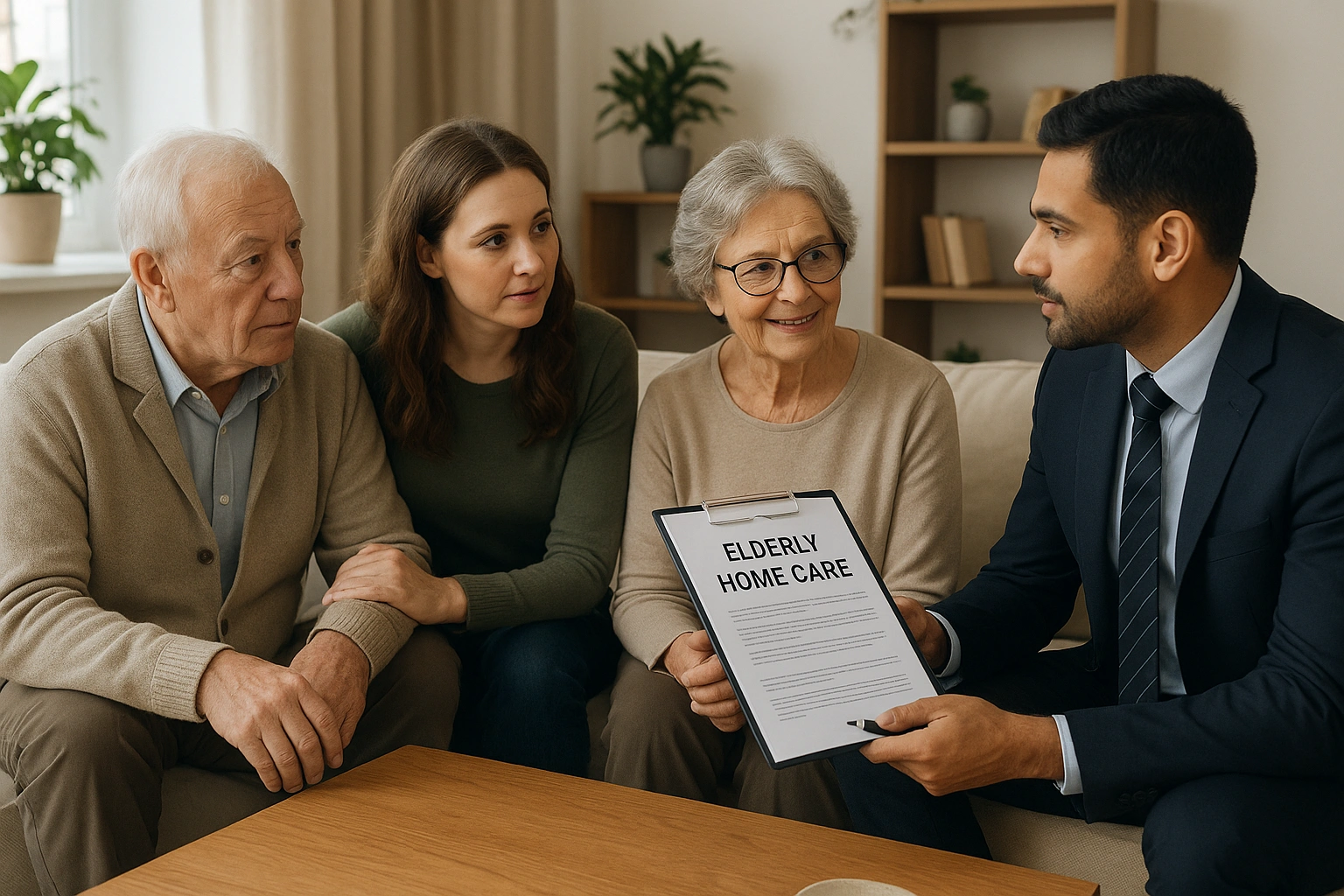The Turning Point: Why Home Care is Redefining Aging in 2025
Nearly 90% of seniors want to stay in their own homes for as long as possible, and finding the right elderly home care services makes that possible. Exploring elderly home care services helps ensure safety, comfort, and independence for your loved one. By choosing elderly home care services carefully, families can match support to specific needs. The right elderly home care services bring peace of mind while enhancing quality of life at home.
What Exactly Are Elderly Home Care Services?
In simple terms, elderly home care services provide a range of professional support that helps seniors live safely and comfortably in their own homes. Many families rely on elderly home care services for daily assistance, from meal preparation to personal care. Some elderly home care services also offer skilled nursing support, ensuring health needs are met without leaving home. Choosing the right elderly home care services allows seniors to maintain independence while receiving the care they need.
In 2025, the relevance of these services has exploded. Driven by technological advancements like telehealth and a growing emphasis on personalized wellness, home care is no longer just about basic needs. It’s about creating a thriving environment. According to a report from the National Institute on Aging, the “aging in place” trend is a cornerstone of modern elder care, allowing seniors to maintain their social ties and sense of self. The industry has evolved from a simple service model to a complex, tech-integrated support system, making it a viable and often preferred alternative to institutional care.

The Overlooked Benefits of In-Home Senior Caregiving Support
Choosing to bring care into the home unlocks a host of benefits that elderly home care services can provide beyond what a facility offers. Elderly home care services focus on personalized attention, ensuring daily routines and preferences are respected. Families often find that elderly home care services enhance comfort, independence, and overall well-being. By selecting the right elderly home care services, seniors can enjoy quality of life while staying safely in their own home.
Promoting Independence and Comfort
The most significant advantage is the ability for seniors to remain in a familiar, comfortable environment. Surrounded by cherished memories, personal belongings, and a familiar neighborhood, they keep their routines, their neighbors, and their sense of control. This isn’t just about emotional comfort—it actively promotes better mental and physical health by reducing the stress and disorientation that can come with moving to a new facility.
Personalized One-on-One Attention
Unlike in residential facilities where staff-to-resident ratios can be high, home care provides focused, one-on-one support. A dedicated caregiver gets to know your loved one’s personality, preferences, and specific needs intimately. This leads to a higher standard of personalized care, from preparing meals exactly how they like them to noticing subtle changes in their health or mood that might otherwise be missed in a busier setting.
Providing Peace of Mind for Families
For adult children, juggling careers, their own families, and a parent’s needs can be incredibly stressful. Senior caregiving support provides a reliable safety net. Knowing a trained professional is there to manage daily tasks, handle potential emergencies, and provide companionship when you can’t be is invaluable. It helps alleviate guilt and anxiety, allowing families to enjoy more quality time with their loved one instead of focusing solely on caregiving tasks.
Cost-Effective Alternative to Nursing Homes
While costs vary, home care is often more affordable than a 24/7 nursing home or assisted living facility, especially if full-time medical supervision isn’t required. You pay for the hours and services you need, offering greater financial flexibility. For many families, a few hours of help a day is significantly more budget-friendly than the thousands of dollars per month required for residential care, as noted in cost-of-care surveys by organizations like Genworth.
Just as a farmer must implement a detailed strategy for the health of their animals, families must create a comprehensive plan for their aging loved ones. Managing these details ensures a safe and nurturing environment. For insights into detailed planning in other fields, you can review resources like this guide on farm management.
Understanding the Different Types of Home Care Services
Not all home care is the same, and choosing the right elderly home care services ensures your loved one gets support tailored to their needs. Understanding the variety of elderly home care services available helps families make informed decisions. Some elderly home care services focus on daily assistance, while others provide medical or skilled nursing care. By exploring different elderly home care services, you can find the options that best enhance comfort, safety, and quality of life.
Companion Care Services
This is a non-medical service focused on emotional support and socialization.
- Services Include: Conversation, playing games, light housekeeping, meal preparation, and transportation to appointments.
- Best For: Seniors who are relatively independent but are experiencing loneliness or need help with daily household tasks.
Personal Care Assistance
This level includes hands-on help with Activities of Daily Living (ADLs).
- Services Include: Everything in companion care, plus assistance with bathing, dressing, grooming, and mobility.
- Best For: Seniors who have physical limitations that make personal hygiene and moving around difficult.
Skilled Nursing Care
This is medical-level care provided by a licensed nurse (RN or LPN) under a doctor’s supervision.
- Services Include: Medication administration, wound care, injections, and monitoring of vital signs.
- Best For: Seniors recovering from surgery, illness, or managing a complex medical condition.
Specialized Care
This care is tailored for individuals with specific health conditions, such as Alzheimer’s, dementia, or Parkinson’s disease.
- Services Include: Memory care activities, specialized safety protocols, condition-specific nutritional support, and communication strategies.
- Best For: Seniors who need caregivers with advanced training and experience in managing complex cognitive or physical conditions.

How to Choose the Right Home Care Agency: A Step-by-Step Guide
Selecting an agency is a critical decision, and finding the right elderly home care services can make all the difference. A careful look at different elderly home care services helps families choose a partner they can trust. Comparing options ensures the elderly home care services you select match your loved one’s needs and preferences. By following a clear roadmap, you can navigate elderly home care services with confidence and peace of mind.
Step 1: Assess Your Loved One’s Needs (and Wants)
Before you even make a call, sit down and create a comprehensive list. Divide it into categories: medical needs (medication schedule, mobility issues), daily living needs (bathing, meal prep), household needs (cleaning, shopping), and social needs (companionship, transportation to social events). Most importantly, involve your loved one in this conversation. What do they feel they need? What are their priorities for maintaining their independence?
Step 2: Research and Shortlist Local Agencies
Use online resources, but don’t stop there. Ask for recommendations from your doctor’s office, local hospital discharge planners, or friends who have been in a similar situation. Look for agencies that have been established for several years and have positive online reviews. Check if they are licensed by the state (if required) and if they are bonded and insured. Create a shortlist of 3-5 agencies to investigate further.

Step 3: The Consultation – Ask the Right Questions
This is your interview of the agency. Prepare a list of questions in advance. Key questions to ask include:
- How do you screen and train your caregivers?
- Can we meet or interview the proposed caregiver beforehand?
- What is your procedure for when a caregiver calls in sick?
- How do you handle complaints or issues?
- How is the care plan developed and updated?
- Can you provide a detailed breakdown of all costs and fees?
Step 4: Check References and Credentials
Don’t just take the agency’s word for it. Ask for a list of references—preferably from families they are currently working with. A reputable agency will be happy to provide them. When you call, ask about their experience with reliability, communication, and the quality of the caregivers provided. This step can provide invaluable insight into the agency’s day-to-day operations and client satisfaction.
Paying for Home Care: A Financial Guide
Understanding your financial options is a crucial part of planning for home care. The costs can be significant, but there are several avenues to explore for funding.
Private Pay
This is the most common method, where families pay for services out-of-pocket using savings, retirement funds, or other assets. It offers the most flexibility in choosing services and providers without being restricted by program rules.
Long-Term Care Insurance
If your loved one has a long-term care insurance policy, review it carefully. Most policies cover non-medical in-home care, but they have specific requirements (like needing help with a certain number of ADLs) and daily or lifetime limits. Contact the insurance provider early to understand the claims process.
Veterans Benefits
The Department of Veterans Affairs (VA) offers programs like the Aid and Attendance benefit, which provides a monthly pension to eligible wartime veterans and their spouses to help cover the cost of care. Check with the VA to determine eligibility and application requirements.
Medicare and Medicaid
As mentioned in the FAQ, Medicare’s home care benefits are limited to short-term, skilled medical care. Medicaid, on the other hand, does offer waivers in many states (Home and Community-Based Services) to help low-income seniors pay for non-medical home care. Eligibility and services vary widely by state, so you’ll need to check with your local Medicaid office.
7 Common Mistakes to Avoid When Hiring a Caregiver
Navigating the world of home care can be tricky. Avoid these common pitfalls to ensure a smooth and successful experience.
- Not Defining Care Needs Clearly: Before you start your search, write down every single task you need help with, from medication reminders to laundry.
Fix: Create a detailed “Care Plan” document and share it during consultations. This ensures everyone has the same expectations from day one.
- Skipping a Thorough Vetting Process: Never hire anyone, agency or independent, without a comprehensive background check.
Fix: Ask agencies for a copy of their background check policy. If hiring independently, use a professional service that checks criminal records and driving history.
- Ignoring the Importance of Personality Fit: A caregiver can be perfectly qualified but have a personality that clashes with your loved one.
Fix: Involve your loved one in the final interview process. The best agencies will facilitate a “meet and greet” to ensure a good match.
- Forgetting Legal and Tax Obligations: If you hire independently, you are an employer. You’re responsible for taxes, insurance, and withholding.
Fix: Consult with a financial advisor or use a payroll service designed for household employees to avoid legal trouble with the IRS.
- Not Having a Backup Plan: What happens if your caregiver gets sick or their car breaks down?
Fix: A key benefit of an agency is that they handle this. If independent, you must have a pre-screened backup caregiver you can call.
- Poor Communication: Small issues can become big problems if they aren’t addressed.
Fix: Establish a communication log (a simple notebook can work) where the caregiver can leave daily notes. Schedule a brief weekly check-in call.
- Overlooking Caregiver Burnout: Caregiving is a demanding job. A burned-out caregiver cannot provide the best care.
Fix: Ensure the caregiver is taking their breaks. An agency should manage this, but it’s good to be aware. Show appreciation for their hard work.
Expert Tips for Ensuring Quality Senior Caregiving Support
To elevate the care experience, implement these best practices from geriatric care experts.
- Create a Central Information Hub: Keep a binder in the home with emergency contacts, medication lists (including dosages and times), doctor information, and the detailed care plan.
- Leverage Technology: Use shared calendar apps (like Google Calendar) for scheduling appointments and caregiver shifts. Consider a simple medication reminder app or a personal emergency response system (PERS) button.
- Focus on a Team Approach: “The best outcomes happen when the family, the caregiver, and the agency work as a collaborative team,” says Dr. Elena Rodriguez, a geriatric care specialist. “Regular, open communication is the glue that holds everything together.”
- Establish Professional Boundaries: The caregiver is a professional employee, not family. Maintaining a respectful, professional relationship is crucial for long-term success. Be friendly, but avoid getting overly involved in their personal life.
- Empower the Caregiver: Provide them with the tools and information they need to succeed. If they mention needing a specific item to make care easier (like a shower chair), be responsive. A supported caregiver provides better care.
- Perform Regular, Gentle Check-ins: Don’t just rely on the caregiver’s report. Pop in unexpectedly from time to time (while being respectful of privacy). Have regular conversations with your loved one alone to ask how things are going.
Frequently Asked Questions (FAQ) About Elderly Home Care
How much do elderly home care services cost in 2025?
Costs vary significantly by location and the level of care required. On average, you can expect non-medical companion and personal care to range from $28 to $40 per hour. Skilled nursing care is higher. Always get detailed quotes from several local providers.
Does Medicare cover home care services?
This is a common point of confusion. Medicare typically only covers short-term, doctor-prescribed skilled nursing care (home health care), often after a hospitalization. It does not cover long-term, non-medical personal or companion care.
What is the difference between home care and home health care?
Home care is primarily non-medical assistance with daily living and companionship. Home health care is clinical, medical care provided by licensed professionals like nurses and therapists to treat an illness or injury.
How do I know when my parent needs home care?
Key signs include a decline in personal hygiene, unexplained bruises (from falls), a messy or cluttered home, weight loss, social withdrawal, and difficulty keeping track of appointments or medications.
Can I really trust a caregiver in my loved one’s home?
Yes, provided you work with a reputable source. Professional agencies are bonded, insured, and conduct extensive Level 2 background checks, drug screenings, and reference verifications to ensure you are getting a trustworthy and qualified professional.
Conclusion: Making the Right Choice for Your Family’s Peace of Mind
Choosing the right path for a parent’s care is one of the most important decisions you will make, and exploring the right elderly home care services can make this journey smoother. By understanding the types of elderly home care services available, you can find options that balance safety and independence. Researching different elderly home care services allows you to make informed choices tailored to your loved one’s needs. With careful planning, the right elderly home care services can enhance not only daily comfort but also overall quality of life.
This decision brings peace of mind, fosters independence, and allows your family to focus on what truly matters: spending quality time together. The right senior caregiving support is more than a service; it’s a partnership that enriches the final chapters of a loved one’s life. For further reading on family caregiving, resources like AARP’s Caregiving section offer invaluable support and information.
e>
